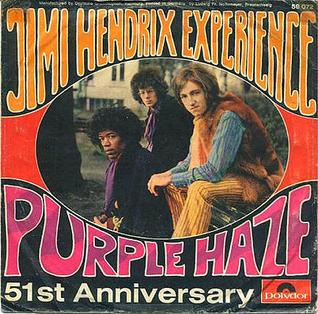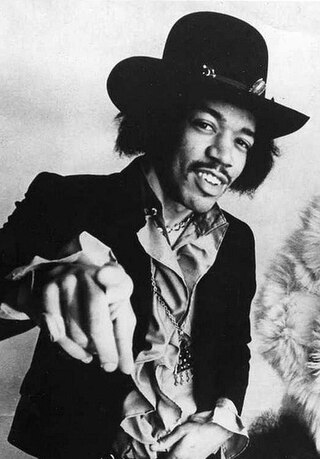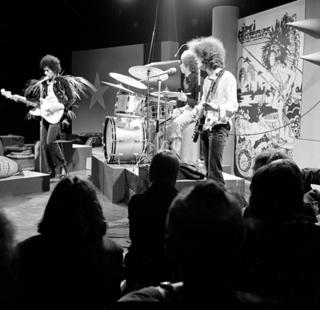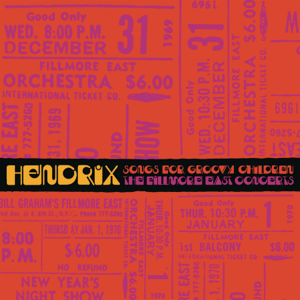
James Marshall "Jimi" Hendrix was an American guitarist, songwriter and singer. Although his mainstream career spanned only four years, he is widely regarded as one of the greatest and most influential electric guitarists in the history of popular music, and one of the most celebrated musicians of the 20th century. The Rock and Roll Hall of Fame describes him as "arguably the greatest instrumentalist in the history of rock music."

"Purple Haze" is a song written by Jimi Hendrix and released as the second single by the Jimi Hendrix Experience on March 17, 1967 in the United Kingdom. The song features his inventive guitar playing, which uses the signature Hendrix chord and a mix of blues and Eastern modalities, shaped by novel sound processing techniques. Because of ambiguities in the lyrics, listeners often interpret the song as referring to a psychedelic experience, although Hendrix described it as a love song. It was included as the opening track in the North American edition of the Experience's debut album, Are You Experienced (1967).
"Little Wing" is a song written by Jimi Hendrix and recorded by the Jimi Hendrix Experience in 1967. It is a slower tempo, rhythm and blues-inspired ballad featuring Hendrix's vocal and guitar with recording studio effects accompanied by bass, drums, and glockenspiel. Lyrically, it is one of several of his songs that reference an idealized feminine or guardian angel-like figure. At about two and a half minutes in length, it is one of his most concise and melodically focused pieces.

Band of Gypsys is a live album by Jimi Hendrix and the first without his original group, the Jimi Hendrix Experience. It was recorded on January 1, 1970, at the Fillmore East in New York City with Billy Cox on bass and Buddy Miles on drums, frequently referred to as the Band of Gypsys. The album mixes funk and rhythm and blues elements with hard rock and jamming, an approach which later became the basis of funk rock. It contains previously unreleased songs and was the last full-length Hendrix album released before his death six months later.

"Foxy Lady" is a song by The Jimi Hendrix Experience. It first appeared on their 1967 debut album Are You Experienced and was later issued as their third single in the U.S. with the alternate spelling. It is one of Hendrix's best-known songs and was frequently performed in concerts throughout his career. Rolling Stone magazine placed the song at number 153 on its list of the "500 Greatest Songs of All Time".
"Red House" is a song written by Jimi Hendrix and one of the first songs recorded in 1966 by the Jimi Hendrix Experience. It has the musical form of a conventional twelve-bar blues and features Hendrix's guitar playing. He developed the song prior to forming the Experience and was inspired by earlier blues songs.

Rainbow Bridge is a 1971 film directed by Chuck Wein centering on the late 1960s counterculture on the Hawaiian island of Maui. Filmed in summer 1970 with non-professional actors and without a script, it features largely improvised scenes with a variety of characters. To bolster the film, executive producer Michael Jeffery brought in his client Jimi Hendrix to film an outdoor concert. Hendrix's heavily edited performance appears near the end of the film.

Jimi Hendrix (1942–1970) was an American guitarist whose career spanned from 1962 to 1970. His discography includes the recordings released during his lifetime. Prior to his rise to fame, he recorded 24 singles as a backing guitarist with American R&B artists, such as the Isley Brothers and Little Richard. Beginning in late 1966, he recorded three best-selling studio albums and 13 singles with the Jimi Hendrix Experience. An Experience compilation album and half of a live album recorded at the Monterey Pop Festival were also issued prior to his death. After the breakup of the Experience in mid-1969, songs from his live performances were included on the Woodstock: Music from the Original Soundtrack and More and Band of Gypsys albums. A studio single with the Band of Gypsys was also released.
"Stone Free" is a song written by Jimi Hendrix and the second song recorded by the Jimi Hendrix Experience. It has been described as a "counterculture anthem, with its lyrics praising the footloose and fancy-free life", which reflected Hendrix's restless lifestyle. Instrumentally, the song has a strong rhythmic drive provided by drummer Mitch Mitchell with harmonic support by bassist Noel Redding. "Stone Free" was issued on December 16, 1966, as the B-side of the Experience's first UK single "Hey Joe" and later included on the Smash Hits compilation album.
"Third Stone from the Sun" is a mostly instrumental composition by American musician Jimi Hendrix. It incorporates several musical approaches, including jazz and psychedelic rock, with brief spoken passages. The title reflects Hendrix's interest in science fiction and is a reference to Earth in its position as the third planet away from the sun in the solar system.

"Freedom" is a rock song by Jimi Hendrix that is often regarded as one of the most fully realized pieces he wrote and recorded in the months before his death. It incorporates several musical styles and the lyrics reflect various situations facing Hendrix at the time.
"Are You Experienced?" is the title song for the Jimi Hendrix Experience 1967 debut album. It has been described as one of Jimi Hendrix's most original compositions on the album by music writer and biographer Keith Shadwick. The song is largely based on one chord and has a drone-like quality reminiscent of Indian classical music. It features recorded guitar and drum parts that are played backwards and a repeating piano octave. Live recordings from 1968 are included on The Jimi Hendrix Concerts album and Winterland box set.

The Cry of Love Tour was a 1970 concert tour by American rock guitarist and singer Jimi Hendrix. It began on April 25, 1970, at the Forum in Inglewood, California, and ended on September 6, 1970, at the Love & Peace Festival in Fehmarn, West Germany. The majority of the 37 shows were in the United States, with two each in Sweden, Denmark, and West Germany, and one in England, where Hendrix was the final act at the Isle of Wight Festival 1970.

Jimi Hendrix (1942–1970) was an American guitarist whose career spanned the years between 1962 and 1970. His posthumous discography includes recordings released after September 18, 1970. Hendrix left behind many recordings in varying stages of completion. This material, along with reissues of his career catalogue, has been released over the years in several formats by various producers and record companies. Since Experience Hendrix, a company owned and operated by members of the Hendrix family, took control of his recording legacy in 1995, over 15 Hendrix albums have appeared on the main US albums chart. Several of these have also placed on charts in more than 18 countries around the world.
"Ezy Ryder" is a song written and recorded by American musician Jimi Hendrix. It is one of the few studio recordings to include both Buddy Miles on drums and Billy Cox on bass, with whom Hendrix recorded the live Band of Gypsys album (1970).

"Hear My Train A Comin'" is a blues-based song written by Jimi Hendrix. Lyrically, it was inspired by earlier American spirituals and blues songs which use a train metaphor to represent salvation. Hendrix recorded the song in live, studio, and impromptu settings several times between 1967 and 1970, but never completed it to his satisfaction.

Jimi Hendrix (1942–1970) was an American guitarist and singer-songwriter whose career spanned from 1962 to 1970. He appeared in several commercially released films of concerts and documentaries about his career, including two popular 1960s music festival films – Monterey Pop (1968) and Woodstock (1970). A short documentary, Experience (1968), also known as See My Music Talking, was also screened.
"Hey Baby (New Rising Sun)" or simply "Hey Baby" is a song written and recorded by American musician Jimi Hendrix, from his second posthumous album Rainbow Bridge (1971). The song is a slower and more melodic piece, which features the prominent use of chorus- and tremolo-effects on guitar. Hendrix uses an idealized feminine figure that recurs in several of his lyrics. Commentators have seen the song as representative of his post-Band of Gypsys musical direction.

Songs For Groovy Children: The Fillmore East Concerts is a chronologically sequenced collection of American musician Jimi Hendrix's 1969–1970 New Years recorded performances at the Fillmore East in New York City. It was released as a box set of five-CDs on November 22, 2019 and an eight-LP set on December 13.












